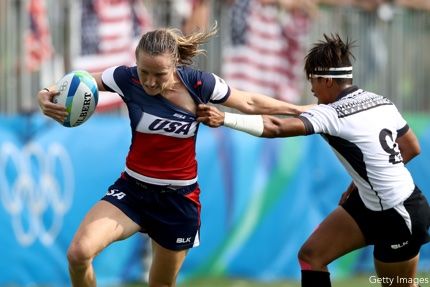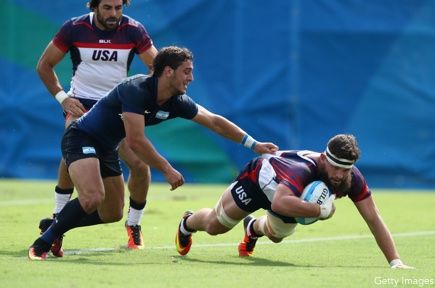It sounds like a ludicrous idea to buy into: a sport that allows minimal protective equipment, and has players the size of Olympic bodybuilders, is a safer alternative to the NFL.
But it's true.
At this June's Collegiate Rugby Championship, Atavus Rugby organized a clinic led by former NFL football players and Team USA rugby players. The purpose was to demonstrate new tackling techniques, adapted from rugby, that will make football safer.
One of the regulars at the CRC, Virginia Tech, is a loud proponent of this movement.
"I have the opinion that football is going to disappear if they don't fix the tackling," says Paul Carron, Virginia Tech's head rugby coach.
Rugby's argument is that its form of tackling is safer because the focus is on stopping the opponent, not creating highlight reel hits like football. The play does not end after a tackle. A tackle is a segue into the next series of events.
Olympic fans are learning this right now. The sport is currently appearing in its first Games since 1924.
"It's honestly a better form of tackling," Carron says. "By throwing your body across in a safe manner, pushing through the hips and actually tackling instead of hitting, bringing the player to the ground is effective and safe."
Seattle Seahawks coach Pete Carroll and Ohio State coach Urban Meyer, two of the most respected names in football, teach rugby-form tackling to the best defensive units in the NFL and NCAA. With the changing rules at both levels, specifically on head-leading tackles, football teams have to adjust anyway.

"Rugby, from the beginning, teaches you how to not hit with your head," says Conor Fay, an All-American center for Virginia Tech. "You aren't protected with a helmet, so you can't blindly throw your head into someone."
Out of rugby tackling, football players can both play within the rules and maintain a healthy lifestyle.
"It takes the head out of the game," says Hokie John Gerard. "Players will be able to have longer careers."
Gerard never played rugby until arriving at college. He was originally recruited by Virginia Tech to be a sprinter for the track team, but he switched to rugby during the first semester. Hence the reasoning for his nickname, "Sprinter John."
"I played football growing up, so I thought the transition to rugby would relatively easy," Gerard added. "The biggest difference was how I was taught to tackle. I never expected it to be so different."
NFL players are witnessing this change of opinion. Speaking to ThePostGame this spring, former NFL linebacker Greg Buttle pointed out the difference in the two traditional minds of thought, and why that needs to change.

"They're similar in the fact that they are contact sports," Buttle says of football and rugby. "They're dissimilar in the fact the NFL is a collision sport. This is a contact sport. This sport's about getting out of the way. The NFL is about getting in the way. It takes the same type of athlete: Fast, strong, good balance.
"You still have head injuries no matter what you do, so I don't know how much different that is other than you don't hit your head into anybody on purpose. That's accidental. In the NFL, it's on purpose."
Change of thought in the NFL is coming. Youth teams are preaching safer (if allowing tackling at all) before players get serious in high school. Rugby's return to the Olympic puts a similar form of tackling on display on international television. Maybe the NFL and NCAA will take a few plays out of the rugby playbook.
More Olympics:
-- 7 Sports You Probably Don't Know Are Olympic Events
-- Best U.S. Olympic Athletes To Follow On Instagram
-- Lilly King And America Celebrate 'Clean' Gold Medal
-- Follow Mac Benson on Twitter @MacMBenson.






